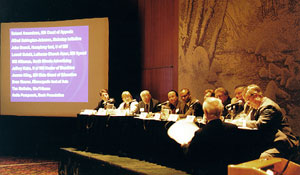Report Sections
Afternoon Session
mprBusiness Group
mprEducation Group
mprPros and Cons
mprEffects
The Socratic Dialogue
In a Socratic dialogue during the symposium's morning session, ten prominent Minnesotans discussed many of the same issues touched on in Dr. Marty's speech. Dr. Marty, the moderator, asked first about the proper role of religion in public discussion of human cloning, a subject that obviously has profound moral, ethical, and religious dimensions.
Drawing a distinction that would surface throughout the day, Minneapolis Star Tribune editor Tim McGuire said his paper looked at it as a scientific story with moral dimensions and concentrated on its moral rather than religious dimensions. The paper did cover those religious dimensions, he added, in its weekly "Faith & Values" section.
 |
|
Martin
Marty leads the Socratic Dialogue
|
Jeffrey Kahn, director of the University of Minnesota Center for Bioethics, drew a similar distinction. Discussion of cloning at the center, he said, focused "not so much on religion as ethics." No one on the center staff had been trained in theology; as part of a public university, he added, the center had to be "very careful" about discussing religion - in part because religion has proved to be so divisive in the discussion of another medical issue, abortion.
Both McGuire and Lowell Erdahl, Bishop Emeritus of the Lutheran Church, criticized this exclusion of religion. By excluding religion, Erdahl said, "We have limited the range of questions we can take up at many great universities."
But the Center for Bioethics is by no means the only public sphere from
which religion is all but excluded. Jeanne Kling, vice president of the Minnesota State Board of Education, said public school teachers are exceedingly cautious even about discussing the subject of religion in class and worry about losing their jobs when it does arise.
Kahn noted that focusing on the moral dimensions "makes you listen to the arguments and take sides based on how the issue is presented," rather than taking a view because it is endorsed by a specific faith. On the other hand, to exclude religion and religious perspectives, Kahn acknowledged, creates a false dichotomy. "We're living in a sort of schizophrenic way," he added.
McGuire, too, saw both benefits and drawbacks to religion remaining in the background. "By dealing with it as a moral issue, you don't take sides - you don't deal with it from the Catholic perspective, or the Jewish perspective, or the perspective of any other religion." On the other hand, he added, "the moral perspective makes it a little antiseptic."
The second topic raised by Dr. Marty was whether religion should influence the marketing of violence. Asked if his company would market a violent but highly profitable video game, Alfred Babington-Johnson, president and CEO of The Stairstep Initiative Companies, said it would be an easy decision. In forming The Stairstep Initiative, which aspires to rebuild the African-American community, his investors and the board of directors had established a set of operating principles. "We decided we would not involve ourselves in businesses that somehow deteriorate the community," Babington-Johnson said. "If I were in a position to decide, we would not issue such a game and would not distribute it."
Advertising executive Bill Hillsman said his company would not take such an account if employees were opposed to doing so. Nor would he ever ask an individual employee to work on an account to which he had moral objections. But that made sense for business reasons, he pointed out, since someone who's morally opposed to a product is unlikely to do a good job selling it.
One reason American society finds it difficult to address this issue, Dr. Marty suggested, is that religion and art of all types are filled with images of violence.
Evan Maurer, director and CEO of the Minneapolis Institute of Arts, drew a sharp distinction between the violence in video games and that which appears in art (and brings complaints from art institute patrons, often on religious grounds): In art, he said, the artist attempts to show a moral perspective and to force the viewer to take a stand. While a large majority of the 100-plus people who attended the symposium described themselves as being religious, not everyone was. "Religion has been a very spurious aid to morality over the centuries," said one man (who nevertheless said he would not market Dr. Marty's hypothetical video game). "There are many ways to form ethical judgments that don't require belief in imaginary matters."
Yet, some people said they would manufacture or market the violent game. One explained that he would rather have children confront difficult issues, such as sex and violence, in an open and appropriate manner.
The vast majority of panelists and audience members said they thought a person's religious beliefs should influence his or her business decisions. But Hillsman raised an issue that would reappear throughout the day: he didn't believe he should impose his religious views on others.
"It's interesting that people say their view should not be imposed on others, but we live in a democracy where the majority rules," Babington-Johnson responded. "Imposing your view on others is a fundamental principle of democracy."
The entire discussion prompted symposium participant Danie Watson, president of the Watson Group, to ask whether "the free market has emerged as a religion." And if it is a religion, she pointed out, there is "no separation between church and state."